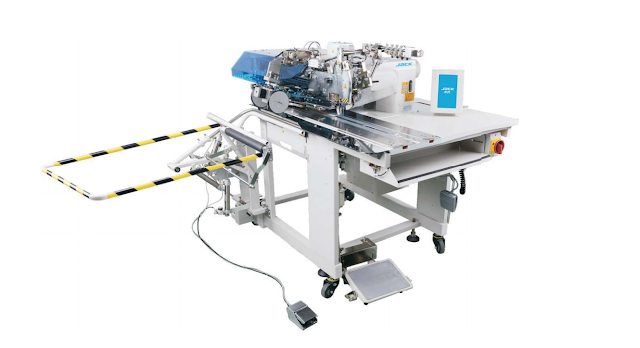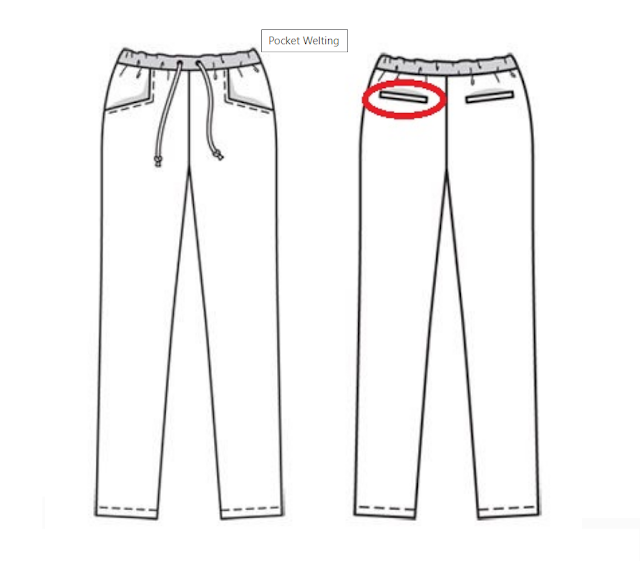 |
APW Machine || Automatic Pocket Welting Machine (Full Automatic, Programmable)Maximum Speed: 3000RPM. Product Characteristics |
Hot Searches.
1. Buy Industrial Auto Sewing Machine.
2. Auxiliary Machine Ready Stock available for sale.
3. Sewing Machine Layout for your garments factory.
4. Denim Bottom Automation.
5. Shirt Sewing Machine Automation.
Uses: Automatic Welting Machine (APW) is a
specialized sewing machine that is commonly used in garment manufacturing
factories to attach a strip of fabric (known as welt) to the edge of a garment,
usually for reinforcement or decorative purposes. The process of using APW to
manufacture garments in a factory typically involves the following steps:
- Preparing the garment pieces: Before the welting
process begins, the garment pieces are cut and prepared according to the design
specifications. The edges of the garment pieces that need to be welted are
usually folded and pressed to create a clean and precise edge.
- Setting up the APW machine: The APW machine is
set up according to the specific requirements of the garment being
manufactured. The machine is adjusted to the correct tension, stitch length,
and stitch type to ensure that the welt is attached to the garment securely and
evenly.
- Feeding the garment pieces into the machine: The garment pieces are fed into the machine, and the edge that needs to
be welted is placed under the welting foot. The operator guides the garment
pieces through the machine, ensuring that the welt is positioned correctly
along the edge of the garment.
- Sewing the welt onto the garment: The APW machine sews
the welt onto the garment edge with a specialized stitch, such as a chain
stitch or a lock stitch. The machine automatically cuts the welt to the correct
length and sews the ends together to create a continuous strip.
- Trimming excess fabric: Once the welt is
attached, any excess fabric is trimmed away using a cutting blade on the APW
machine. This ensures that the finished garment has a clean and neat
appearance.
- Inspecting the finished garment: Finally, the
finished garment is inspected to ensure that the welt is securely attached and
that there are no loose threads or other defects. If any issues are identified,
the garment may be reworked or repaired before being sent for further
processing.
Overall, the use of an Automatic Welting Machine
(APW) in garment manufacturing allows for a faster and more efficient
production process, while also ensuring consistent and high-quality results.
Advantages: An Automatic Pocket
Welting (APW) machine is a specialized sewing machine designed to automate the
process of creating welts (a strip of material sewn into a seam to reinforce or
finish it) on pockets. Here are some advantages of using an APW machine:
- Consistency and precision: An APW machine
ensures consistent and precise welting for each pocket, regardless of the
operator's skill level. This helps to maintain a high level of quality in the
finished product.
- Increased productivity: APW machines can
work at high speeds, which can increase productivity and reduce labor costs.
- Reduced labor costs: As the machine is
automated, it reduces the amount of labor required for pocket welting. This can
help to reduce labor costs and increase efficiency.
- Flexibility: APW machines can be programmed to work
with a variety of materials and pocket styles, making them highly versatile.
- Improved safety: An APW machine can
be operated without the need for manual manipulation of the needle, which can
reduce the risk of injury to the operator.
- Enhanced customization: APW machines can be
used to create custom welting designs and patterns, which can help to
differentiate a product from its competitors.
Overall, using an APW machine can help to increase
productivity, reduce labor costs, improve quality, and enhance safety, making
it a valuable investment for manufacturers of pocketed garments.
Preparations before buying an automatic pocket welting (APW)
machine:
Before buying an Automatic Pocket Welting (APW)
machine, it is essential to do some preparations to ensure that the machine
will meet your needs and requirements. Here are some preparations you should
consider:
- Determine your production needs: Analyze your
production needs, such as the number of pockets to be welted per day, the types
of materials to be used, and the pocket styles. This will help you to determine
the appropriate machine size and capacity that can meet your production
requirements.
- Research different machines: Research different
APW machines available in the market, including their features, capabilities,
and price ranges. Compare the machines based on their speed, accuracy, ease of
use, and maintenance requirements.
- Consider the space and layout: Determine the space
and layout required for the machine, including the electrical and air supply
needed for the machine's operation. Ensure that the workspace is adequate for
the machine and allows for safe and efficient operation.
- Evaluate the support and training provided by the manufacturer: Ensure that the manufacturer provides adequate technical support and
training to operate and maintain the machine. Check if the manufacturer offers
on-site training or online training resources.
- Check the machine warranty and maintenance requirements: Ensure that the machine comes with a warranty, and the manufacturer
provides maintenance and repair services. Review the maintenance requirements
of the machine to ensure that they are within your capabilities.
By considering these preparations, you can make an
informed decision when purchasing an APW machine that meets your production
needs and requirements.
Components: An automatic pocket
welting (APW) machine is a specialized industrial sewing machine used for
attaching pockets to garments. The APW machine has several components that work
together to achieve its function. These components include:
- Sewing Head: The sewing head is the part of the APW
machine that does the actual sewing. It consists of a needle, feed dog, and
presser foot. The sewing head moves back and forth to create stitches that
attach the pocket to the garment.
- Pocket Feeder: The pocket feeder is responsible for
feeding the pocket material into the sewing head at the correct time and
position. It consists of two rollers that pull the pocket material through the
machine.
- Garment Feeder: The garment feeder moves the garment
material into position so that the sewing head can attach the pocket to the
garment. It consists of a flat surface and a set of rollers that hold and move
the garment material.
- Knife: The knife is used to cut the pocket
material to the correct size and shape before it is attached to the garment.
The knife is located near the pocket feeder and is operated automatically by
the machine.
- Thread Cutter: The thread cutter is a small device
that cuts the thread after the stitching is complete. It is located near the
sewing head and is also operated automatically by the machine.
- Control Panel: The control panel is where the
operator sets the machine's parameters, such as stitch length, pocket size, and
positioning. The control panel may be digital or analog and may include a touch
screen.
- Servo Motor: The servo motor is the power source
for the machine. It provides the energy needed to move the various components
and to control the sewing speed.
Overall, the APW machine is a complex piece of
equipment that requires specialized knowledge to operate and maintain. Its
various components work together to create precise and durable pocket
attachments on garments.
Problems and Solutions: Here are some
mechanical problems that can occur with an automatic pocket welting (APW)
machine, and their solutions:
- Needle breakage: Needle breakage can
occur due to a variety of reasons, such as using the wrong size or type of
needle, or improper tension settings. To solve this problem, check that the
correct needle is being used and that it is properly installed. Adjust the
tension settings as necessary.
- Feed dog jamming: Feed dog jamming can
occur when the fabric does not move smoothly through the machine, causing the
feed dog to get stuck. This can be caused by a buildup of lint or other debris,
or a problem with the machine's timing. To solve this problem, clean the feed
dog and surrounding area thoroughly. Check the machine's timing and adjust as
necessary.
- Thread tension issues: Thread tension
issues can cause the thread to break or produce poor quality stitches. This can
be caused by improper threading, incorrect tension settings, or problems with
the bobbin or needle. To solve this problem, check that the machine is threaded
correctly and that the tension settings are appropriate for the fabric being
used. Replace the needle or bobbin as necessary.
- Knife problems: The knife on an APW machine can become
dull or misaligned, causing it to not cut the fabric properly. To solve this
problem, sharpen or replace the knife as necessary. Check that it is properly
aligned with the other machine components.
- Motor problems: Motor problems can cause the machine
to run too slowly or not at all. This can be caused by problems with the wiring
or the motor itself. To solve this problem, check the wiring and connections.
If the motor is faulty, it may need to be repaired or replaced.
- Timing issues: Timing issues can cause the machine to produce poor-quality stitches or not work at all. This can be caused by wear and tear on the machine or improper adjustments. To solve this problem, have the machine serviced by a trained technician to check the timing and make any necessary adjustments. In general, proper maintenance and regular servicing can help prevent many of these mechanical problems from occurring with an APW machine.




Post a Comment